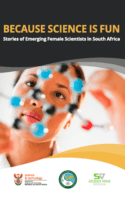Rapela Regina Maphanga arrived at the University of Limpopo oblivious to what awaited her – not knowing what to expect or what course she would be doing.
Now she is turning that painful experience into something positive.
“For many learners nothing has changed since I was at school. They still have to walk long distances, their primary school teachers only have Grade 8, they get taught in their home language and the schools have the bare minimum in terms of resources and teaching materials.”
Rapela said many bright kids will never get to study further not just because their parents are too poor to pay for studies, but shamefully because they are not told that there are options available for them to pursue.
It has long been a desire of Rapela’s to help disadvantaged learners by providing them with the necessary information needed to encourage them to at least start thinking about studying further and to then help them make better decisions as to what career to choose.
Rapela, an Associate Professor at the University of Limpopo (UL), started slowly at first, just visiting one school in her work area to give motivational talks.
“I share my story of only choosing my course of study on the day of registration and how I chose a BSc with majors in maths and science because of an ability my Grade 5 teacher, Mr Frederick Kgobe, spotted and encouraged.”
She tells them of the highs of doing so well at primary school that Frederick had arranged for her to skip Grade 6 and then the lows of dropping from an A-learner at high school to a B-student during her first three years at university.
Her story continues with Professor Phuti Ngoepe who recruited her with the promise of a bursary to do an Honours year in physics as part of a research grant he was awarded by Delta EMD, an electrolytic manganese dioxide (EMD) manufacturer and supplier to the global alkaline battery industry.
“We were tasked by Delta EMD to do some research on electrolytic manganese oxide and we managed to successfully develop a computational model for them to use. By the end of my Honours year I was back to being an A-student.”
After completing her MSc, her supervisor encouraged her to convert her thesis into a PhD, because “it just needed a few things added.” It was the first time in the history of the university that an MSc was converted into a PhD.
In 2015, a colleague of hers, Dr Mabel Mphahlele, joined her initiative, adding her story to the dialogue. They named this collaboration “Science for Rural Girls (SORG – Sorg in Afrikaans means care) and have since adopted four schools in their area.
“Although the motivational talks are given to both boys and girls, our main focus is on reaching the girls. We try to build relationships with the young women in the hope that they will contact us and we are setting up a closed Facebook page to facilitate this.”
Plans are underway to institute a yearly prize to encourage the learners and reward them for their efforts. The prize, which Rapela and Mabel themselves would fund, would go to the best performing student in Grade 10 -12 of each school.
Their hope, however, is that they would be able to get a sponsor who would supply SORG with i-Pads which they could give away as prizes and that eventually SORG would be taken to rural schools all across South Africa.
“It is just like Rapela to begin an initiative like this, she always thinks of everybody else before herself, she always gives but never expects anything in return,” commented Dr Peter Ntoahae, a Senior Lecturer in the Department of Physics at the University of Limpopo.
Peter has known Rapela since 1997 when she attended his second-year lectures on modern physics. Rapela said it was his influence that helped her fall in love with teaching and a life in academia.
“I saw potential in her so during her MSc studies I began taking her along to my first-year physics lectures to observe my teaching. Later on, she taught and I observed. When the time was right I recommended that she be given an opportunity to teach first-year physics to pharmacy students,” he said.
Perhaps it was his encouragement that helped Rapela to see that she too could reach out to the young learners and help them become the best people they could be.
Another area Rapela is passionate about is the limited support women in academics get in order to contribute to their respective fields.
In 2007, she became a co-founding member of the University of Limpopo Women Academics Solidarity Association (ULWASA) in order to address this.
“We encourage and support postgraduate students and staff members involved in research, most notably by arranging a bi-yearly retreat to a quiet place where the women can focus on their writing, whether a thesis, proposal, article or publication.”
The Vice-Chancellor of UL supports and sponsors these retreats. The initiative has been so successful that membership of ULWASA has grown from 17 to 120 members.


